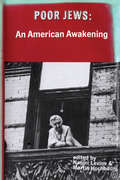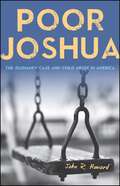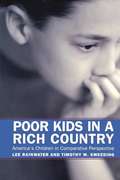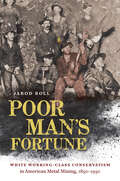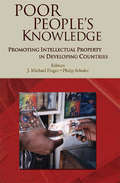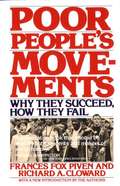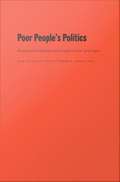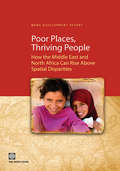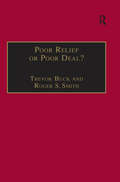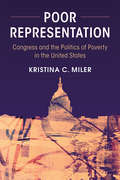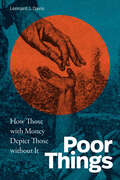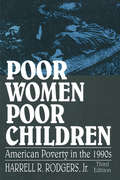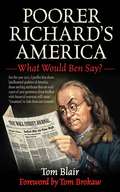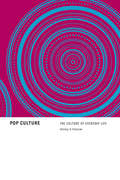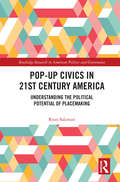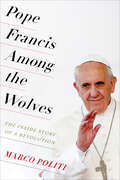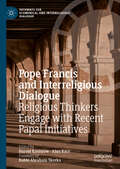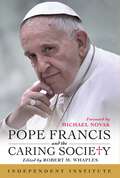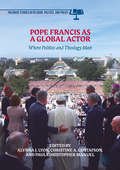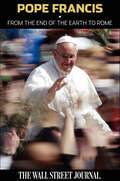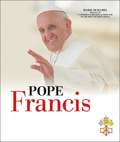- Table View
- List View
Poor Jews: An American Awakening
by Naomi Levine and Martin HochbaumThe popular image of the Jewish community is that it consists primarily of members of the middle and upper middle classes. But this image is far from true. Poor Jews: An American Awakening shatters, once and for all, the stereotype of Jewish affluence.Citing national data and descriptions of the life-styles of the Jewish poor, the authors reveal unique social characteristics of the Jewish poor—including the surprising statistic that over two-thirds of the members of this group are past the age of sixty, thus experiencing the compounded disadvantage of being poor, elderly, and deserted by the young, mobile Jewish community.Reasons for the "invisibility" of Jewish poverty are examined, as well as how the Jewish community has responded to poverty within its own ethnic group and Jewish attitudes toward the welfare state and charity. The lack of Jewish participation in antipoverty programs is cited, along with measures which will bring them fully into this and other federal and state programs.
Poor Joshua: The DeShaney Case and Child Abuse in America
by John R. HowardIn DeShaney v. Winnebago County Department of Social Services, a bitterly divided Supreme Court rejected a claim brought on behalf of five-year old Joshua DeShaney, left permanently disabled after sustained abuse, despite regular home visits by social workers charged with monitoring his welfare. In its decision the court asserted that the state has no duty to shield citizens from private violence, even those involved in their lives and knowing of their distress. Poor Joshua tracks the story from its origins in small town Wisconsin to the Supreme Court and chronicles the tragic consequences of the majority decision. John R. Howard shows how that decision became the rock on which later child abuse cases foundered, and how it echoes today in every newspaper story about society's failure to protect children. The continuing vitality of DeShaney, he argues, derives from a persistent sense that the decision is legally incorrect and profoundly at odds with the underlying values of the Constitution. The case is also about different visions of our social order and the relationship between "law" and "justice." Howard summarizes the substantial law review literature critical of the DeShaney decision and erects the scaffolding for a counterargument bringing law into a closer alignment with justice.
Poor Kids In A Rich Country: America's Children In Comparative Perspective
by Lee Rainwater Timothy M. SmeedingIn comparing the situation of American children in low-income families with their counterparts in other wealthy countries, Lee Rainwater and Timothy M. Smeeding provide a powerful perspective on the dynamics of child poverty in the United States.
Poor Man's Fortune: White Working-Class Conservatism in American Metal Mining, 1850–1950
by Jarod RollWhite working-class conservatives have played a decisive role in American history, particularly in their opposition to social justice movements, radical critiques of capitalism, and government help for the poor and sick. While this pattern is largely seen as a post-1960s development, Poor Man's Fortune tells a different story, excavating the long history of white working-class conservatism in the century from the Civil War to World War II. With a close study of metal miners in the Tri-State district of Kansas, Missouri, and Oklahoma, Jarod Roll reveals why successive generations of white, native-born men willingly and repeatedly opposed labor unions and government-led health and safety reforms, even during the New Deal. With painstaking research, Roll shows how the miners' choices reflected a deep-seated, durable belief that hard-working American white men could prosper under capitalism, and exposes the grim costs of this view for these men and their communities, for organized labor, and for political movements seeking a more just and secure society. Roll's story shows how American inequalities are in part the result of a white working-class conservative tradition driven by grassroots assertions of racial, gendered, and national privilege.
Poor Man's Fortune: White Working-Class Conservatism in American Metal Mining, 1850–1950
by Jarod RollWhite working-class conservatives have played a decisive role in American history, particularly in their opposition to social justice movements, radical critiques of capitalism, and government help for the poor and sick. While this pattern is largely seen as a post-1960s development, Poor Man's Fortune tells a different story, excavating the long history of white working-class conservatism in the century from the Civil War to World War II. With a close study of metal miners in the Tri-State district of Kansas, Missouri, and Oklahoma, Jarod Roll reveals why successive generations of white, native-born men willingly and repeatedly opposed labor unions and government-led health and safety reforms, even during the New Deal. With painstaking research, Roll shows how the miners' choices reflected a deep-seated, durable belief that hard-working American white men could prosper under capitalism, and exposes the grim costs of this view for these men and their communities, for organized labor, and for political movements seeking a more just and secure society. Roll's story shows how American inequalities are in part the result of a white working-class conservative tradition driven by grassroots assertions of racial, gendered, and national privilege.
Poor People's Knowledge: Promoting Intellectual Property in Developing Countries
by J. Michael Finger Philip SchulerHow can we help poor people earn more from their knowledge-rather than from their sweat and muscle alone? This book is about increasing the earnings of poor people in poor countries from their innovation, knowledge, and creative skills. Case studies look at the African music industry; traditional crafts and ways to prevent counterfeit crafts designs; the activities of fair trade organizations; biopiracy and the commercialization of ethnobotanical knowledge; the use of intellectual property laws and other tools to protect traditional knowledge. The contributors' motivation is sometimes to maintain the art and culture of poor people, but they recognize that except in a museum setting, no traditional skill can live on unless it has a viable market. Culture and commerce more often complement than conflict in the cases reviewed here. The book calls attention to the unwritten half of the World Trade Organization's Agreement on the Trade Related Aspects of Intellectual Property (TRIPS). TRIPS is about knowledge that industrial countries own, and which poor people buy. This book is about knowledge that poor people in poor countries generate and have to sell. It will be of interest to students and scholars of international trade and law, and to anyone with an interest in ways developing countries can find markets for cultural, intellectual, and traditional knowledge.
Poor People's Movements: Why They Succeed, How They Fail
by Frances F. Piven Richard A. ClowardHave the poor fared best by participating in conventional electoral politics or by engaging in mass defiance and disruption? The authors of the classic Regulating The Poor assess the successes and failures of these two strategies as they examine, in this provocative study, four protest movements of lower-class groups in 20th century America: -- The mobilization of the unemployed during the Great Depression that gave rise to the Workers' Alliance of America -- The industrial strikes that resulted in the formation of the CIO -- The Southern Civil Rights Movement -- The movement of welfare recipients led by the National Welfare Rights Organization.
Poor People's Politics: Peronist Survival Networks and the Legacy of Evita
by Javier Auyero"Political clientelism" is a term used to characterize the contemporary relationships between political elites and the poor in Latin America in which goods and services are traded for political favors. Javier Auyero critically deploys the notion in Poor People's Politics to analyze the political practices of the Peronist Party among shantytown dwellers in contemporary Argentina. Looking closely at the slum-dwellers' informal problem-solving networks, which are necessary for material survival, and the different meanings of Peronism within these networks, Auyero presents the first ethnography of urban clientelism ever carried out in Argentina. Revealing a deep familiarity with the lives of the urban poor in Villa Paraso, a stigmatized and destitute shantytown of Buenos Aires, Auyero demonstrates the ways in which local politicians present their vital favors to the poor and how the poor perceive and evaluate these favors. Having penetrated the networks, he describes how they are structured, what is traded, and the particular way in which women facilitate these transactions. Moreover, Auyero proposes that the act of granting favors or giving food in return for votes gives the politicians' acts a performative and symbolic meaning that flavors the relation between problem-solver and problem-holder, while also creating quite different versions of contemporary Peronism. Along the way, Auyero is careful to situate the emergence and consolidation of clientelism in historic, cultural, and economic contexts. Poor People's Politics reexamines the relationship between politics and the destitute in Latin America, showing how deeply embedded politics are in the lives of those who do not mobilize in the usual sense of the word but who are far from passive. It will appeal to a wide range of students and scholars of Latin American studies, sociology, anthropology, political science, history, and cultural studies.
Poor Places, Thriving People: How the Middle East and North Africa Can Rise Above Spatial Disparities
by World BankGeographical differences in living standards are a pressing concern for policymakers in the Middle East and North Africa (MENA). Economies of agglomeration mean that production is most efficient when concentrated in leading areas. So how can the region reduce spatial disparities in well-being without compromising growth? The solution to spatial disparities lies in matching the policy package to a lagging area's specific characteristics. Key questions include: is the lagging area problem really as serious as one thinks; is it a problem of low economic opportunity or of poor human development; are lagging area populations close enough to agglomerations to benefit from spillovers; and is there manifest private investor interest? Drawing on the World Bank's 2009 World Development Report, Reshaping Economic Geography, the book proposes 3 policy packages. First, all lagging areas can benefit from a "level playing-field for development" and investment in people. Geographic disparities in the policy environment are a legacy of MENA's history, and gaps in human development are a major component of spatial disparities. Smart policies for the investment environment, health, education, social transfers and urban development can therefore close spatial gaps in living standards. Second, lagging areas that are close to economic agglomeration can benefit from spillovers - provided that they are connected. MENA's expenditure priority is not necessarily long-distance primary connections, but infrastructure maintenance and short-distance connections such as rural roads and peri-urban networks. Public-private partnerships can also bring electronic connectivity to lagging areas. Third, shifting regional development policy away from spatial subsidies towards the facilitation of cluster-based growth will increase the chance of cost-effective impacts. The final chapter of the book examines the institutional prerequisites for effective spatial policy. It argues that MENA's centralized/sectoral structures are not always adapted to governments' spatial development agendas, and describes alternative institutional options.
Poor Relief or Poor Deal?: The Social Fund, Safety Nets and Social Security (Studies in Cash & Care)
by Trevor BuckThe social fund has been a controversial instrument of social policy in the UK since its introduction in 1988. This book brings together new research and debate on the role and effect of the social fund in relieving poverty, and introduces evidence from the wider European field to allow comparison to be made with other countries' experience of providing a 'safety net' for their poorest citizens. This book opens up for wider discussion the question of how to provide help for disadvantaged groups and individuals at times of financial crisis. Addressing practical questions about how such schemes work (or fail to work) effectively, the book also provides the basis for more general consideration of the overall objectives which they are expected to meet. This will contribute to new thinking about the policy goals of the social fund and other emergency payment schemes, and their role in meeting broader aspirations such as cohesion, inclusion and social justice.
Poor Representation: Congress and the Politics of Poverty in the United States
by Kristina C. MilerTens of millions of Americans live in poverty, but this book reveals that they receive very little representation in Congress. While a burgeoning literature examines the links between political and economic inequality, this book is the first to comprehensively examine the poor as a distinct constituency. Drawing on three decades of data on political speeches, party platforms, and congressional behavior, Miler first shows that, contrary to what many believe, the poor are highly visible to legislators. Yet, the poor are grossly underrepresented when it comes to legislative activity, both by Congress as a whole and by individual legislators, even those who represent high-poverty districts. To take up their issues in Congress, the poor must rely on a few surrogate champions who have little district connection to poverty but view themselves as broader advocates and often see poverty from a racial or gender-based perspective.
Poor Richard
by James DaughertyThis lively text exemplifies both the man and the artist. Benjamin Franklin lived in turbulent times and met those times head-on with passion and gusto. James Daugherty—ever the patriot himself—has captured that essential nature of Franklin in his energetic and dramatic three-color lithographs that reveal the neophyte as he faces the fresh soil of a young nation filled with optimism and promise. From his Quaker childhood to his early days as printer's apprentice to runaway, to stranger in the City of Brotherly Love, to the "Water American" in London, Ben's youth was filled with adventures and challenges that taught him invaluable lessons about human nature. These lessons would serve him well as he grew to be a leader of the young colonies as they faced the tyranny of Britain. As a leader in the American Revolution he was indispensable as an ambassador to England and later France where he won the hearts of the nation by his simple Quaker wisdom and geniality. All these things were accomplished while he pursued his interests as scientist, inventor, and prolific author. In everything he did, Franklin was always compelled by how he might best serve his fellow man.
Poor Things: How Those with Money Depict Those without It
by Lennard J. DavisFor generations most of the canonical works that detail the lives of poor people have been created by rich or middle-class writers like Charles Dickens, John Steinbeck, or James Agee. This has resulted in overwhelming depictions of poor people as living abject, violent lives in filthy and degrading conditions. In Poor Things, Lennard J. Davis labels this genre “poornography”: distorted narratives of poverty written by and for the middle and upper classes. Davis shows how poornography creates harmful and dangerous stereotypes that build barriers to social justice and change. To remedy this, Davis argues, poor people should write realistic depictions of themselves, but because of representational inequality they cannot. Given the obstacles to the poor accessing the means of publication, Davis suggests that the work should, at least for now, be done by “transclass” writers who were once poor and who can accurately represent poverty without relying on stereotypes and clichés. Only then can the lived experience of poverty be more fully realized.
Poor Women, Poor Children: American Poverty in the 1990s
by RodgersThis work presents the most recent data on poverty, family structure and participation in welfare programmes. It analyses the causes for the continuing rise in female-headed households, the high rates of poverty among such families, and evaluates past, present and future reform policies.
Poorer Richard's America: What Would Ben Say?
by Tom Brokaw Tom BlairFor decades, Benjamin Franklin's Poor Richard's Almanack provided sage advice and commentary on eighteenth-century America. Now, a modern businessman reflects-writing as Benjamin Franklin-on what America has become. Federal and personal debt are ballooning beyond sustainable levels. Our futures are being jeopardized. Partisan bickering and the entrenched powers of special interests have made it nearly impossible for a real leader to lead. Where is a good American to turn? How about to the man who wrote this timeless observation: "A small leak will sink a great ship"? Ben is back! With his signature intelligence and wit (not to mention a good sprinkling of aphorisms both old and new), Benjamin Franklin, through Tom Blair, moves from the national deficit to Wall Street, from health care to marital bliss. The result is electrifying.
Pop Culture: The Culture of Everyday Life
by Shirley FedorakWhile usually associated with facets of commercial culture, pop culture can and must be analyzed as an important part of material, economic, and political culture. The author begins by defining popular culture, outlining criticisms, and examining the impact of globalization on pop culture. She then explores mass media and popular culture (soap operas, Egyptian melodramas, Afro-Cuban rap music, and virtual communities), artistic expression and popular culture (graffiti art and body art), and gatherings and popular culture (fast food in Japan, equality in sport, and wedding rituals).
Pop Princess: Book 4
by Rosie BanksA gorgeous new series about best friends and magical princesses!Best friends Charlotte and Mia are training to be Secret Princesses, magical princesses who grant wishes! But mean Princess Poison has a plan to stop them. If they don't grant the last wish, Wishing Star Palace will be destroyed forever!The girls have to help Samira's wish come true, even if it means stepping into the spotlight themselves! Can the girls grant Sam's wish and save Wishing Star Palace before it's too late?Plus...* Special campaign with Monsoon Children's - win the same princess outfits as Charlotte and Mia for you and your best friend!* Collect the tokens for a exclusive Best Friends necklace designed by Monsoon!
Pop Princess: Book 4 (Secret Princesses #4)
by Rosie BanksA gorgeous new series about best friends and magical princesses!Best friends Charlotte and Mia are training to be Secret Princesses, magical princesses who grant wishes! But mean Princess Poison has a plan to stop them. If they don't grant the last wish, Wishing Star Palace will be destroyed forever!The girls have to help Samira's wish come true, even if it means stepping into the spotlight themselves! Can the girls grant Sam's wish and save Wishing Star Palace before it's too late?Plus...* Special campaign with Monsoon Children's - win the same princess outfits as Charlotte and Mia for you and your best friend!* Collect the tokens for a exclusive Best Friends necklace designed by Monsoon!
Pop-Up Civics in 21st Century America: Understanding the Political Potential of Placemaking (Routledge Research in American Politics and Governance)
by Ryan SalzmanHow people associate and engage in politics in the 21st century is notably different from similar behaviors in the 20th century. Ryan Salzman examines the political potential of placemaking, an increasingly popular set of behaviors that were unfamiliar to the American public until the last two decades. Placemaking exemplifies a shift that is occurring in the way Americans participate in their political system, and it appears that that participation is increasingly effective in the context of American democracy. Informed by interviews, surveys, and material review, Salzman compares the process of placemaking to traditional political and associational behaviors, providing evidence that placemaking has tremendous political potential. Placemaking is an innovative set of behaviors, largely understood to influence economic and community development. From painting crosswalks to community gardens, Americans are engaging in their communities with real political and civic consequences. This text expands our understanding of placemaking, updating the way we think about civic and political engagement in the 21st century. Pop-Up Civics in 21st Century America: Understanding the Political Potential of Placemaking will be of interest to those who study and research political behavior, civil society, arts and politics, social movements, and urban public policy.
Pope Francis Among the Wolves: The Inside Story of a Revolution
by Marco PolitiA behind-the-scenes view of the power struggles within the Vatican and &“a look inside the byzantine halls of the institutional Catholic Church.&”—Publishers Weekly A journalist who has long covered the Vatican, Marco Politi takes us deep inside the struggle roiling the Roman Curia and the Catholic Church worldwide, beginning with Benedict XVI, the pope who famously resigned in 2013, and intensifying with the unexpected election of Jorge Mario Bergoglio, archbishop of Buenos Aires, now known as Pope Francis. Politi&’s account balances the perspectives of Pope Francis&’s supporters, Benedict&’s sympathizers, and those disappointed members of the laity who feel alienated by the institution&’s secrecy, financial corruption, and refusal to modernize. Politi dramatically recounts the sexual scandals that have rocked the church and the accusations of money laundering and other financial misdeeds swirling around the Vatican and the Italian Catholic establishment, and how Pope Francis&’s attempts to address these crimes has been met with resistance from entrenched factions. He writes of the decline in church attendance and vocations to the priesthood as the church continues to prohibit divorced and remarried Catholics from receiving Communion. He visits European parishes where women perform the functions of missing male priests—and where the remaining parishioners would welcome the ordination of women, if the church would allow it. Pope Francis&’s emphasis on pastoral compassion for all who struggle with the burden of family life has also provoked the ire of traditionalists. He knows from experience what life is like for the poor in South America and elsewhere, and highlights the contrast between the vital, vibrant faith of these parishioners and the disillusionment of European Catholics. As Pope Francis and his supporters are locked in battle with the defenders of the traditional hard line and with ecclesiastical corruption, the future of Catholicism is at stake—and it is far from certain Francis will succeed in saving the institution from decline.
Pope Francis and Interreligious Dialogue: Religious Thinkers Engage with Recent Papal Initiatives (Pathways for Ecumenical and Interreligious Dialogue)
by Harold Kasimow Alan RaceThis book engages thinkers from different religious and humanist traditions in response to Pope Francis’s pronouncements on interreligious dialogue. The contributors write from the perspectives of Judaism, Christianity, Islam, Hinduism, Sikhism, Buddhism, and Humanism. Each author elaborates on how the pope’s openness to dialogue and invitation to practical collaboration on global concerns represents a significant achievement as the world faces an uncertain future. The theological tension within the Catholic double commitment to evangelization on the one hand, and dialogue on the other, remains unresolved for most writers, but this does not prevent them from praising the strong invitation to dialogue–especially with the focus on justice, peace, and ecological sustainability.
Pope Francis and the Caring Society
by Robert M. WhaplesPope Francis and the Caring Society is a thoughtful and in-depth exploration of the Pope&’s earnest call for a dialogue on building a truly compassionate society.Francis&’s fervent support for uplifting the poor and protecting the environment has inspired far-reaching discussions worldwide: What is the most effective way to fight poverty? Can environmental resources be better protected with property rights? Are the poor better off under a market economy? And what value does a religious perspective offer in addressing moral, political, and economic problems? Pope Francis and the Caring Society is an indispensable resource for consideration of these vital questions. Edited by Robert M. Whaples, with a foreword by Michael Novak, the book provides an integrated perspective on Francis and the issues he has raised, examining the intersection of religion, politics, and economics. Readers will discover important historical and cultural context for considering Francis&’s views, along with non-bureaucratic solutions for environmental preservation, an analysis of Francis&’s criticism of power and privilege, the case for market-based entrepreneurship and private charity as the essential tools for fighting poverty, and an examination of Francis&’s philosophy of the family. Pope Francis and the Caring Society is essential reading for anyone interested in creating a better, more caring, and prosperous world.
Pope Francis as a Global Actor: Where Politics And Theology Meet (Palgrave Studies in Religion, Politics, and Policy)
by Alynna J. Lyon Christine A. Gustafson Paul Christopher ManuelPope Francis confuses many observers because his papacy does not fit neatly into any pre-established classificatory schemes. To gain a deeper appreciation of Francis’s complicated papacy, this volume proposes that an interdisciplinary approach, fusing concepts derived from moral theology and the social sciences, may properly situate Pope Francis as a global political entrepreneur. The chapters in this volume ask what difference it makes that he is the first pope from Latin America, how and why different countries in the world respond to him, how his understanding of scripture informs his ideas on economic, social, and environmental policy, and where politics meets theology under Francis. In the end, this volume seeks to provide a more robust understanding of the enigmatic papacy of Francis.
Pope Francis: From the End of the Earth to Rome
by The Staff of the Wall Street JournalOn March 13, the cardinals of the Catholic Church, gathered to elect a successor to a living Pope for the first time in 600 years, announced a dramatic shift. By elevating Cardinal Jorge Mario Bergoglio of Argentina to become Pope Francis the 266th Pontiff, the cardinals were naming the first-ever Pope from the growing New World to take the helm of the church at a crucial moment.It was a stunning move by a 2,000-year-old institution that has immense influence—with 1.2 billion adherents worldwide—and huge problems, including a decade-old sex-abuse scandal that has shattered faith in the institution, a shortage of priests and secular trends that have drained the church of members and challenged its relevancy in a changing world.From the shocking decision by Pope Benedict XVI to retire, to the introduction of Pope Francis, from the back streets of Buenos Aires to the front row at St. Peter's Square, reporters from The Wall Street Journal have chronicled these dramatic weeks in the life of the oldest institution in the world. Now, in a new e-book, Journal reporters will present a detailed, timely and original biography of the new Pope Francis, as well as new insight on the bargaining and drama that surrounded his rise. Pope Francis will present the full, in-depth story of the church's change in direction and the man charged with leading it, and consider how Pope Francis might address the years of scandal and shortcomings while leading Catholics worldwide toward a deeper faith.
Pope Francis: The Story of the Holy Father
by Marie DuhamelFrom the moment he was elected into the papacy, Pope Francis has captured the attention of the world with his humility, charisma, and reformist spirit.This one-of-a-kind, illustrated biography of the first Jesuit pope offers more than 250 photographs and 50 removable documents from Francis's life. Written by Vatican Radio reporter Marie Duhamel, this intimate portrait includes his parents emigration from Italy, his birth as Jorge Mario Bergoglio in 1936, his love of soccer and opera as a child, the pneumonia that nearly cost him his life as a young adult, his calling to the priesthood, and his first encounter with poverty as a missionary in Chile that would change his life. Duhamel chronicles Francis's rise from priest to bishop to cardinal to the papacy and how, along the way, he impressed many people-and alienated some-with his courage to stand up to authority and his dedication to helping the poor.Enclosed documents such as his baptism certificate, photographs from his childhood, pages from a school notebook, handwritten notes as pope, and even a support card for his beloved San Lorenzosoccer club, further illuminate his life and create a lasting keepsake of this pope of the people.
